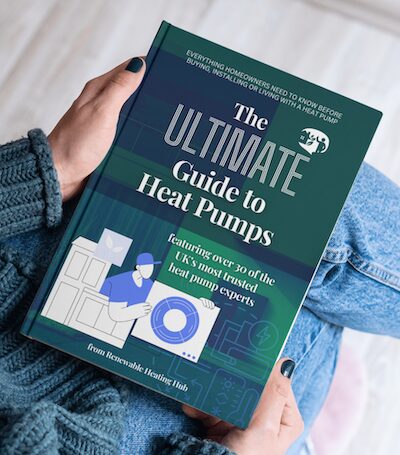Please don't shout at me! Electric boiler vs ASHP
Hello! I posted a couple of months ago about getting quotes for installing an ASHP in our 1950 end of terrace, currently heated by an oil fired back boiler. Getting quotes has been like pulling teeth and after trying four different companies we've only managed to end up with 2 actual quotes. One at £14.5k with a Stiebel Eltron WPL 17 ACS, 200l water tank and 100l buffer tank and one at £9,052 for an 8kw Samsung 6th Generation Monoblock with 200l tank. Both have decided the microbore and current rads should be fine. There's a big difference in the price, the cheaper guy came recommended and says the price is down to the fact that everyone else who gives you the quote gets commission on farming out the actual work to someone else.
My mum, who will be paying for the work, is skeptical about ASHPs and is basically wanting to know why we don't just get an electric boiler like a normal person. She's getting electric ceramic radiator things fitted in her flat and thinks we should get these. I think they are probably just as expensive as any other electric heater but I think she's not going to allow us to choose the ASHP if we can't show her some convincing figures on how an ASHP compares against an electric boiler/electric boiler plus ceramic heating. I've tried to explain that ASHPs are more efficient but even I have run out of steam faced with the argument that an electric boiler might be less efficient but it's doesn't have to be on all the time like an ASHP, and it runs with the same efficiency all year so the running costs might end up the same over the year.
Can anyone help with some figures so we can either convince my reticent mother that an ASHP is a good decision or ind out that it's as bad an idea as she thinks and just be retro with an electric boiler?
Thank you very much!
Hi AmyFOD,
It can be difficult to convince people about the benefits of an ASHP from the efficiency point of view, when it is not easy to explain how you get more energy out than you put in.
First of all, just as with any form of heating system, ASHP's do not run constantly. They may be switched on so that they are available, but they only operate when there is a heat demand. Just like your refrigerator is switched on all the time, but you will hear the compressor start and stop periodically.
Direct electric heating is at best 100% efficient, so for each 1 kWh of electrical energy put in you will get 1 kWh of heat energy out. At it's worst an ASHP is at least 250% efficient, so for each 1 kWh of electrical energy put in you get at least 2.5 kWh of heat energy out. Direct electric heating would therefore be at least 2.5 times more expensive to run compared to an ASHP.
Using less energy is not only good for the planet but also for your bank balance.
Whatever your heating system it is important to have good insulation and controls that allow the operation of the system to be optimised.
I hope that the above helps you to convince your Mum.
Hi Derek,
Thank you for this, I will do my best to leverage what we can. I suppose my main concern is that there is a lot of information out there suggesting that they never really run as efficiently as they're supposed to and you need to get so much right to get it to work properly! I'm going to spend a bit more time looking through all the specifications and trying to work out if we've been offered the right sort of system. We're getting some more insulation put in and we've got old double glazing, although we're in a high radon area so have quite a lot of vents in the house, so that doesn't help. But then I suppose that doesn't help whatever kind of heating we have!
Thanks for your help and advice.
Amy
Hi Amy,
During the warmer Spring and Autumn periods an ASHP should be 400% efficient or even greater, the efficiency starts to reduce as the ambient air temperature falls below +5C, but should still be of the order of 250% at -10C.
As you are in a Radon area, you may wish to consider Mechanical Ventilation Heat Recovery (MVHR), which uses the warm air being exhausted to heat the colder air being drawn in. There are now systems that incorporate an ASHP which makes the process even more efficient. The only drawback is that they don't qualify for any form of grant, since they are an Air to Air ASHP rather than the Air to Water type that most people have installed.
If your budget allows you may also wish to consider a solar PV system to help power the ASHP.
As an FYI we have a 12kw system. Today its been using around 2kw to heat our hot water, so somewhere in the region of 500%-600% efficient 2kw in 12kw out
We too have recently moved to a high radon area. Just got the test results back and investigating an exterior sump extractor type of venting. Early days in our research yet.
Retrofitted 11.2kw Mitsubishi Ecodan to new radiators commissioned November 2021.
14 x 500w Monocrystalline solar panels.
2 ESS Smile G3 10.1 batteries.
ESS Smile G3 5kw inverter.
It's also worth mentioning that heating in flats is a bit different from houses, because in flats you often have a lot of walls and floors that are heated by your neighbours. So you have less heat demand, and so pure electric heat could make more sense. Also you typically don't have a lot of space for a heating system, hence the popularity of storage heaters. Whereas in a house you have more space and a lot more external walls that, even if well insulated, have cold exterior air on the outside. So the balance may swing towards spending more outlay in installation versus less in running costs, versus a cheaper install but sky high running costs.
- 27 Forums
- 2,495 Topics
- 57.8 K Posts
- 260 Online
- 6,220 Members
Join Us!
Worth Watching
Latest Posts
-
RE: Setback savings - fact or fiction?
@cathoderay The input power is largely determined by...
By RobS , 31 minutes ago
-

RE: Humidity, or lack thereof... is my heat pump making rooms drier?
@editor, this is now an example of greenwashing in the ...
By Majordennisbloodnok , 42 minutes ago
-

RE: Electricity price predictions
@transparent Im impressed by all your work on this. ...
By JamesPa , 2 hours ago
-

RE: Solis inverters S6-EH1P: pros and cons and battery options
Just to wrap this up here for future readers: The S...
By Batpred , 2 hours ago
-
RE: Struggling to get CoP above 3 with 6 kw Ecodan ASHP
Welcome to the forums.I assume that you're getting the ...
By Sheriff Fatman , 3 hours ago
-

RE: What determines the SOC of a battery?
I agree. Fogstar confirmed that the Seplos BMS does ...
By Batpred , 3 hours ago
-
RE: Say hello and introduce yourself
@editor @kev1964-irl This discussion might be best had ...
By GC61 , 4 hours ago
-

RE: Testing new controls/monitoring for Midea Clone ASHP
@benson — as @tasos suggests, plotting multiple variabl...
By cathodeRay , 6 hours ago
-

@painter26 — as @jamespa says, it's for filling and re-...
By cathodeRay , 8 hours ago
-

RE: Oversized 10.5kW Grant Aerona Heat Pump on Microbore Pipes and Undersized Rads
@uknick TBH if I were taking the floor up ...
By JamesPa , 19 hours ago
-

RE: Getting ready for export with a BESS
I would have not got it if it was that tight
By Batpred , 20 hours ago
-
RE: Need help maximising COP of 3.5kW Valiant Aerotherm heat pump
@judith thanks Judith. Confirmation appreciated. The ...
By DavidB , 24 hours ago
-

RE: Recommended home battery inverters + regulatory matters - help requested
That makes sense. I thought better to comment in this t...
By Batpred , 24 hours ago
-
Bosch CS5800i 7kW replacing Greenstar Junior 28i
My heat pump journey began a couple of years ago when I...
By Slartibartfast , 1 day ago
-

RE: How to control DHW with Honeywell EvoHome on Trianco ActiveAir 5 kW ASHP
The last photo is defrost for sure (or cooling, but pre...
By JamesPa , 1 day ago
-

RE: Plug and play solar. Thoughts?
Essentially, this just needed legislation. In Germany t...
By Batpred , 1 day ago
-
RE: A Smarter Smart Controller from Homely?
@toodles Intentional opening of any warranty “can of wo...
By Papahuhu , 1 day ago
-
RE: Safety update; RCBOs supplying inverters or storage batteries
Thanks @transparent Thankyou for your advic...
By Bash , 1 day ago
-
RE: Air source heat pump roll call – what heat pump brand and model do you have?
Forum Handle: Odd_LionManufacturer: SamsungModel: Samsu...
By Odd_Lion , 1 day ago
-
RE: Configuring third party dongle for Ecodan local control
Well, it was mentioned before in the early pos...
By F1p , 2 days ago
-

RE: DIY solar upgrade - Considering adding more panels
I know this is a bit old, but it made me wonder what co...
By Batpred , 2 days ago
-

RE: New Vaillant aroTherm Plus in black - When will it come to the UK?
@majordennisbloodnok Daikin, take note! (In fact, I hav...
By Toodles , 2 days ago
-

RE: Midea ASHP – how to set weather compensation
@mk4 — good work! First, I agree, no evidence of cycl...
By cathodeRay , 2 days ago



